Licensed IP vs Unregulated Adviser: What’s the Difference?
Anderson Brookes Insolvency Practitioners help directors close limited companies with debt quickly, legally and with expert guidance every step of the way. Our in-house IPs are licensed. Speak to us today.
Contact us for free and confidential advice
Licensed IP and Unregulated Advisers
When your business is struggling with financial difficulties, seeking professional advice is essential. However, not all advice is equal. Understanding the difference between a licensed insolvency practitioner (IP) and an unregulated adviser can significantly impact your financial outcomes and personal liability.
What is a Licensed Insolvency Practitioner?
A Licensed Insolvency Practitioner (IP) is a qualified professional, authorised and regulated to handle formal insolvency processes. Their role includes managing company liquidations, administrations, and voluntary arrangements, always adhering strictly to UK insolvency laws and ethical standards. Licensed IPs must pass rigorous professional exams and are regulated by recognised professional bodies such as ICAEW, IPA, or ICAS. See our Company Liquidation Guide.
Risks of Using an Unregulated Adviser
Unregulated advisers are individuals or companies who offer insolvency advice without proper qualifications or regulatory oversight. These advisers often operate through lead generation websites, acting as middlemen, or directly as rogue firms.
Common risks associated with unregulated advisers include:
| Risk | Explanation |
|---|---|
| Hidden Fees | Advertise low fixed fees, but later add hidden or unexpected charges. |
| Misleading Promises | Make unrealistic promises about writing off debts or handling directors’ loan accounts without proper assessment. |
| Lack of Regulation | No protection from regulatory bodies, meaning fewer safeguards and higher risks of misconduct. |
| Poor Communication | Often stop communicating effectively once fees are paid, leaving directors unsupported. |
| Legal Complications | Provide questionable advice potentially leading to further legal or financial complications, including personal liability. |
Testimonials
Our clients praise our professionalism, reliability, and the exceptional support we provide during challenging times, helping thousands of company directors through insolvency, liquidation, and business debt solutions.
Why Choose a Licensed IP?
Opting for a licensed insolvency practitioner provides critical advantages:
Regulatory Protection: IPs must comply with strict standards enforced by professional bodies, ensuring transparency and ethical conduct.
Qualified Advice: IPs have extensive knowledge and experience, providing tailored solutions based on your company’s specific circumstances.
Clear Communication: Licensed practitioners offer clear explanations throughout the insolvency process, ensuring you understand your options and responsibilities.
Protection from Personal Liability: IPs thoroughly assess risks like personal guarantees and directors’ loan accounts, offering realistic and reliable guidance. And making sure you benefit from redundancy claims, for example.
Protect Yourself with Professional Advice
At Anderson Brookes, our Licensed Insolvency Practitioners provide trusted, regulated, and expert insolvency advice. We ensure that you are fully informed about your options, responsibilities, and any potential risks to personal assets.
For a confidential, no-obligation consultation, contact Anderson Brookes today:
Email: advice@andersonbrookes.co.uk
Phone: 0800 1804 933 (freephone)
Choosing regulated, professional advice protects you and your business from unnecessary risks, ensuring the best possible outcome during difficult financial circumstances.
Our Team
At Anderson Brookes, our experienced and approachable team works closely with company directors across the UK to provide practical, straightforward insolvency advice and support.

Neil Batty
Managing Director

Rikki Burton
Licensed Insolvency Practitioner

Jasmine Baxter
Licensed Insolvency Practitioner

Rebecca Marden
Operations Manager

Mike Halliday
Senior Business Advisor

Ashley Jones
Insolvency Advice Manager
Warning Signs of an Unregulated Adviser
Before engaging with an adviser, look out for these red flags:
Promises that seem “too good to be true” about eliminating debts entirely.
Aggressive sales tactics pushing specific solutions, which seem to contradict with what you already know, or not considering your unique circumstances.
Lack of clear, detailed communication about insolvency processes and their implications.
No evidence of professional qualifications or membership of recognised regulatory bodies.


